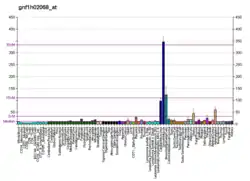PTGFRN
Prostaglandin F2 receptor negative regulator is a protein that in humans is encoded by the PTGFRN gene.[5][6] PTGFRN has also been designated as CD315 (cluster of differentiation 315).
| PTGFRN | |||||||||||||||||||||||||
|---|---|---|---|---|---|---|---|---|---|---|---|---|---|---|---|---|---|---|---|---|---|---|---|---|---|
| Identifiers | |||||||||||||||||||||||||
| Aliases | PTGFRN, CD315, CD9P-1, EWI-F, FPRP, SMAP-6, prostaglandin F2 receptor inhibitor | ||||||||||||||||||||||||
| External IDs | OMIM: 601204 MGI: 1277114 HomoloGene: 7908 GeneCards: PTGFRN | ||||||||||||||||||||||||
| |||||||||||||||||||||||||
| |||||||||||||||||||||||||
| |||||||||||||||||||||||||
| |||||||||||||||||||||||||
| Orthologs | |||||||||||||||||||||||||
| Species | Human | Mouse | |||||||||||||||||||||||
| Entrez | |||||||||||||||||||||||||
| Ensembl | |||||||||||||||||||||||||
| UniProt | |||||||||||||||||||||||||
| RefSeq (mRNA) | |||||||||||||||||||||||||
| RefSeq (protein) | |||||||||||||||||||||||||
| Location (UCSC) | Chr 1: 116.91 – 116.99 Mb | Chr 3: 101.04 – 101.11 Mb | |||||||||||||||||||||||
| PubMed search | [3] | [4] | |||||||||||||||||||||||
| Wikidata | |||||||||||||||||||||||||
| |||||||||||||||||||||||||
References
- GRCh38: Ensembl release 89: ENSG00000134247 - Ensembl, May 2017
- GRCm38: Ensembl release 89: ENSMUSG00000027864 - Ensembl, May 2017
- "Human PubMed Reference:". National Center for Biotechnology Information, U.S. National Library of Medicine.
- "Mouse PubMed Reference:". National Center for Biotechnology Information, U.S. National Library of Medicine.
- Orlicky DJ, Berry R, Sikela JM (Jul 1996). "Human chromosome 1 localization of the gene for a prostaglandin F2alpha receptor negative regulatory protein". Hum Genet. 97 (5): 655–8. doi:10.1007/BF02281878. PMID 8655148. S2CID 21645802.
- "Entrez Gene: PTGFRN prostaglandin F2 receptor negative regulator".
- Charrin, S; Le Naour F; Oualid M; Billard M; Faure G; Hanash S M; Boucheix C; Rubinstein E (Apr 2001). "The major CD9 and CD81 molecular partner. Identification and characterization of the complexes". J. Biol. Chem. United States. 276 (17): 14329–37. doi:10.1074/jbc.M011297200. ISSN 0021-9258. PMID 11278880.
- Stipp, C S; Orlicky D; Hemler M E (Feb 2001). "FPRP, a major, highly stoichiometric, highly specific CD81- and CD9-associated protein". J. Biol. Chem. United States. 276 (7): 4853–62. doi:10.1074/jbc.M009859200. ISSN 0021-9258. PMID 11087758.
Further reading
- Orlicky DJ (1997). "Negative regulatory activity of a prostaglandin F2 alpha receptor associated protein (FPRP)". Prostaglandins Leukot. Essent. Fatty Acids. 54 (4): 247–59. doi:10.1016/S0952-3278(96)90055-1. PMID 8804121.
- Orlicky DJ, Lieber JG, Morin CL, Evans RM (1998). "Synthesis and accumulation of a receptor regulatory protein associated with lipid droplet accumulation in 3T3-L1 cells". J. Lipid Res. 39 (6): 1152–61. PMID 9643346.
- Nagase T, Kikuno R, Ishikawa KI, et al. (2000). "Prediction of the coding sequences of unidentified human genes. XVI. The complete sequences of 150 new cDNA clones from brain which code for large proteins in vitro". DNA Res. 7 (1): 65–73. doi:10.1093/dnares/7.1.65. PMID 10718198.
- Stipp CS, Orlicky D, Hemler ME (2001). "FPRP, a major, highly stoichiometric, highly specific CD81- and CD9-associated protein". J. Biol. Chem. 276 (7): 4853–62. doi:10.1074/jbc.M009859200. PMID 11087758.
- Charrin S, Le Naour F, Oualid M, et al. (2001). "The major CD9 and CD81 molecular partner. Identification and characterization of the complexes". J. Biol. Chem. 276 (17): 14329–37. doi:10.1074/jbc.M011297200. PMID 11278880.
- Clark KL, Zeng Z, Langford AL, et al. (2001). "PGRL is a major CD81-associated protein on lymphocytes and distinguishes a new family of cell surface proteins". J. Immunol. 167 (9): 5115–21. doi:10.4049/jimmunol.167.9.5115. PMID 11673522.
- Strausberg RL, Feingold EA, Grouse LH, et al. (2003). "Generation and initial analysis of more than 15,000 full-length human and mouse cDNA sequences". Proc. Natl. Acad. Sci. U.S.A. 99 (26): 16899–903. Bibcode:2002PNAS...9916899M. doi:10.1073/pnas.242603899. PMC 139241. PMID 12477932.
- Ota T, Suzuki Y, Nishikawa T, et al. (2004). "Complete sequencing and characterization of 21,243 full-length human cDNAs". Nat. Genet. 36 (1): 40–5. doi:10.1038/ng1285. PMID 14702039.
- Otsuki T, Ota T, Nishikawa T, et al. (2007). "Signal sequence and keyword trap in silico for selection of full-length human cDNAs encoding secretion or membrane proteins from oligo-capped cDNA libraries". DNA Res. 12 (2): 117–26. doi:10.1093/dnares/12.2.117. PMID 16303743.
- Yang XH, Kovalenko OV, Kolesnikova TV, et al. (2006). "Contrasting effects of EWI proteins, integrins, and protein palmitoylation on cell surface CD9 organization". J. Biol. Chem. 281 (18): 12976–85. doi:10.1074/jbc.M510617200. PMID 16537545.
- Sala-Valdés M, Ursa A, Charrin S, et al. (2006). "EWI-2 and EWI-F link the tetraspanin web to the actin cytoskeleton through their direct association with ezrin-radixin-moesin proteins". J. Biol. Chem. 281 (28): 19665–75. doi:10.1074/jbc.M602116200. PMID 16690612.
External links
- PTGFRN+protein,+human at the US National Library of Medicine Medical Subject Headings (MeSH)
This article is issued from Wikipedia. The text is licensed under Creative Commons - Attribution - Sharealike. Additional terms may apply for the media files.




